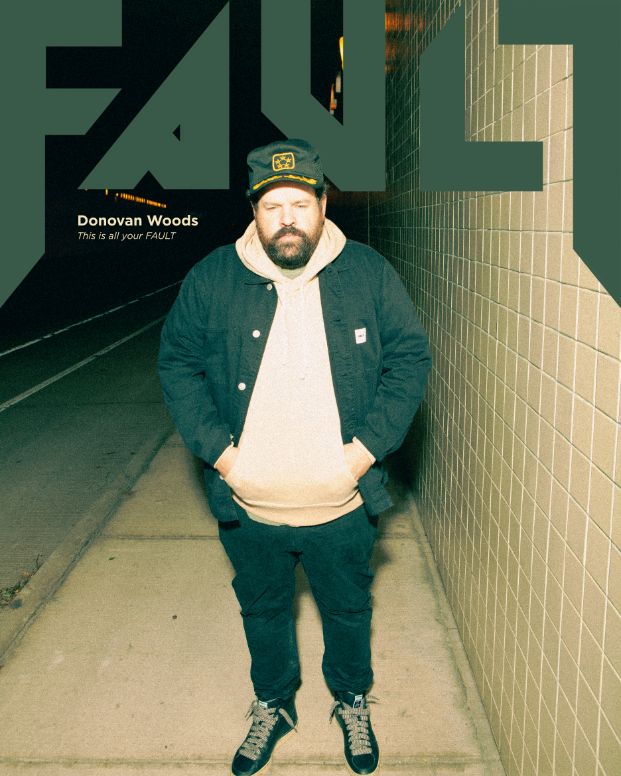Donovan Woods FAULT Magazine Covershoot and Interview

You’re a very honest songwriter and you share your life stories and failures very openly with your audience, do you find it’s easier for you to express your emotion and learning through song as opposed to the spoken word?
It’s easier to make the stories beautiful and useful. It’s like, I always think, while someone is telling me a “bad air-travel experience” story, that I would rather be stuck on an airplane than hear them tell me about it. Music is a nice way to complain and be frustrated in a beautiful way that’s useful to people.
Did you find the writing of ‘I Hope You Change Your Mind’ to be a therapeutic experience?
Yes. I am divorced, the friend I wrote it with is going through a separation, and I think it was therapeutic for both of us to write about someone who disagrees in an understanding way with their partner’s desire for change. I think it’s important for us (particularly men) to remember that acceptance and adaptation is a bolder show-of-force than anger.
Does your writing process change in any way when penning tracks for other artists to perform?
Not really, no. If I’m writing with them, of course their vision will be a big part of it. I’m always just trying to write a song I love and can’t stop thinking about.
What would you say was the hardest track to write on Big Hurt Boy?
I don’t know if any of them were particularly difficult. I feel like it’s hard to write a good song, ever. And there were a lot of not-great ones written while I was trying to write those ones. Music is hard. The hardest part for me is recording, I would say.
You’re a great storyteller and build narrative so eloquently through your songwriting; do you think you do this to aid in your audiences’ understanding of your true emotions, or is it instead to mask your emotions behind a grander narrative?
This is an interesting question, not sure I totally understand it. I think songwriting is somewhat unbearable when it’s instructive. You know, like, “You gotta love and love your life” type of shit. I mean, that said, “Love The One You’re With” is amazing. So, obviously I don’t know what I’m talking about. I think songwriting is at its best when it’s reflecting how it feels to be an alive person in the world right now.
What would you say was the biggest challenge you’ve had to overcome on your musical journey?
I didn’t get played on the radio until I was 30. Not giving up in my 20s was really hard. I tried to a couple times. It ruined many personal relationships, and my parents were stressed out.
What’s been the best piece of advice you’ve ever received?
My dad demonstrates the great advice he gave me all the time and it’s, ‘No matter what’s going on around you, be interested.’ Pay attention, because there are so many interesting and lovely and horrible things to notice all day every day.
What would you hope to achieve with this upcoming EP?
I don’t know. I feel like the “I make art for this reason” idea is oversold these days. Of course, a broader narrative of why someone creates is interesting. And I guess I’m always hungry to learn about the motivations of my favourite artists. And of course, wonderful art is made for all types of noble and good reasons. I feel like most artists make art compulsively and they just feel better when they do it. I make up songs reflexively and it’s one of a very short list of things that make me feel good. I’m lucky that some people like to listen to them, so I get to keep doing it. Ultimately, I hope they help people feel good, or like, feel pensive while looking out the window of a train (absolutely the most noble use of a song).
What are you most excited for this year?
Touring. I want to go to other places and see people.
What is your FAULT?
A horoscope birthday book once nailed my flaws so hard that I remember them and think of them most days. They are: PRICKLY, DEFENSIVE, DIFFICULT. I’m working on it.